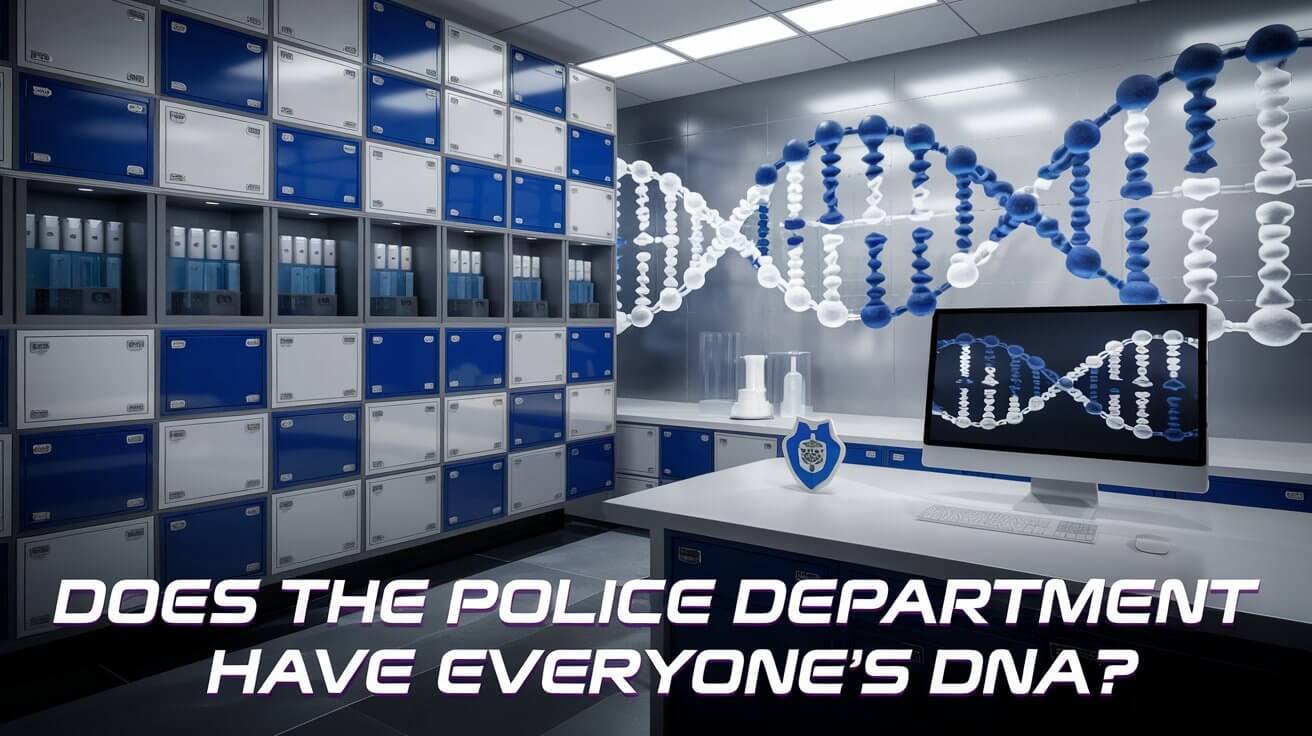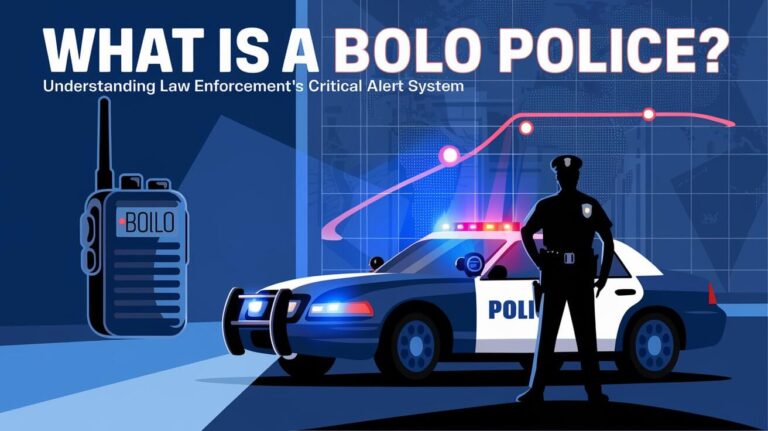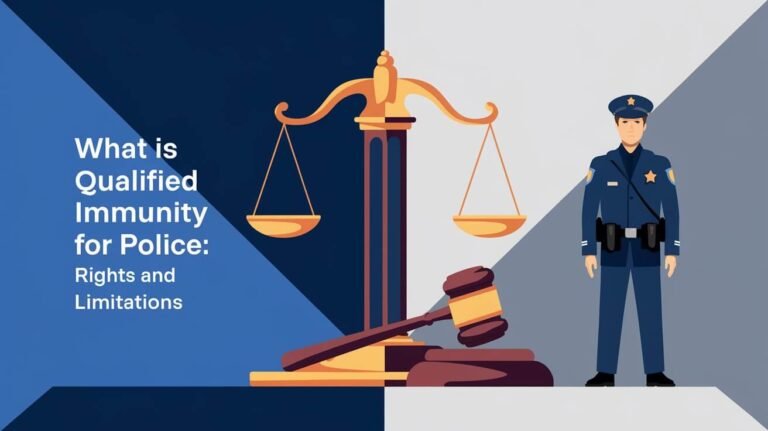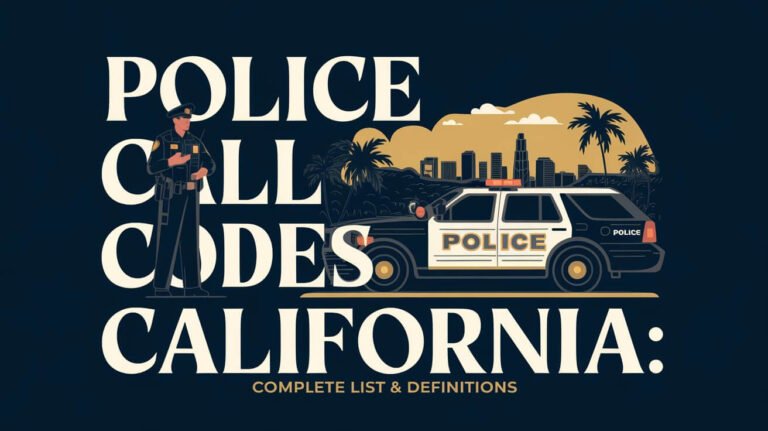Does The Police Department Have Everyones DNA? Facts Revealed

DNA technology is now a big part of police work. The FBI’s CODIS system has over 11 million DNA profiles. This has made people wonder if police have everyone’s DNA and what it means for privacy.
Police use DNA to solve crimes and find suspects. It’s important to think about how DNA affects our rights and freedoms.
In the U.S., local police are collecting DNA from many people. This includes kids and those not accused of any crime. It’s stored in local databases, raising concerns about misuse.
Police use Rapid DNA machines to quickly check DNA samples. This makes DNA a key tool in solving crimes and catching suspects.
Police DNA Database Fundamentals
The police DNA database is a key tool for law enforcement. It helps solve crimes and identify suspects. At its core is the Combined DNA Index System (CODIS), a national database run by the FBI. CODIS lets agencies compare DNA from crime scenes with known profiles, making it easier to solve crimes.
CODIS manages a lot of DNA data. This includes profiles from crime scenes, known individuals, and missing persons. This info is very useful in investigations. It helps link suspects to crimes and identify unknown people.
Components of the CODIS System
- DNA profiles from crime scenes, which are used to identify suspects and solve crimes
- Known DNA profiles, which are collected from individuals, often in the context of a criminal investigation
- Missing persons’ DNA profiles, which aid in the identification of human remains and the location of missing individuals
Database Access Protocols
There are strict rules to keep the DNA database safe and secure. Only those with permission can access it. The data is used only for law enforcement work. This keeps the database safe from misuse and protects the privacy of those whose DNA is stored.
DNA databases have changed how police work. They make solving crimes more efficient and effective. By using DNA evidence with other methods, police can build stronger cases and catch criminals.
Current DNA Collection Laws by State
DNA collection laws differ across the United States. Each state has its own rules for this process. Law enforcement must follow these state laws during investigations.
In California, for example, DNA can be taken without consent. This applies to those arrested for felonies or serious misdemeanors.
Some important points about state DNA collection laws include:
- Thirty states allow DNA collection before conviction as of May 2015
- All fifty states allow DNA collection after conviction
- Thirty-one states and the federal government have laws for DNA collection at arrest as of June 2012
These laws help use DNA evidence in investigations. This has led to over 300 exonerations. The Genetic Information Nondiscrimination Act also protects genetic privacy.
It requires companies to share their DNA collection and usage policies. Understanding these laws is key for law enforcement to use DNA correctly.
When Police Can Legally Collect DNA Samples
Police can take DNA samples in certain situations. Laws about this vary by state. For example, Florida requires DNA from those charged with felonies and some misdemeanors.
They can take DNA from people arrested for crimes that could lead to prison. They also collect DNA from crime scenes to find suspects. People can give DNA samples voluntarily to help with investigations.
Methods of DNA Collection
DNA samples are usually taken by swabbing the mouth or a blood test. People can choose how they want to give a sample, unless a court says they must. Police can’t take DNA for minor crimes without consent.
Circumstances for DNA Collection
- Arrest: The police can collect DNA samples from individuals who have been arrested for criminal offenses.
- Crime Scene: DNA samples can be collected from crime scenes to identify suspects and solve crimes.
- Voluntary Submissions: Individuals can voluntarily submit DNA samples for law enforcement purposes.
It’s wise to talk to a lawyer before giving a DNA sample to the police. DNA collection is a key tool for solving crimes. Knowing when DNA can be taken is important.
Does the Police Department Have Everyone’s DNA? The Truth
The police department doesn’t have DNA from every person. Instead, they have a database of DNA profiles. These profiles help identify suspects and solve crimes. The FBI maintains this database for law enforcement across the country.
New DNA technology, like Rapid DNA machines, has made DNA analysis faster. For example, Louisiana is the first to use Rapid DNA in booking. This allows police to get DNA results in under 90 minutes. Rapid DNA technology offers several benefits:
- Fast results: DNA profiles can be obtained in under 90 minutes
- High success rate: Rapid DNA machines have a 90% success rate of producing a full DNA profile
- Crime solving: Rapid DNA technology has helped solve crimes such as homicides, carjackings, and burglaries
Even though the police department’s DNA database isn’t complete, it’s very useful. DNA technology, including Rapid DNA machines, is key in law enforcement. Its role will only grow as the technology improves.
DNA Privacy Rights and Legal Protections
DNA privacy is a big concern today, thanks to law enforcement using DNA tests more often. The Fourth Amendment guards against unreasonable searches and seizures. This means DNA collection might be seen as a search or seizure. So, police must find a balance between solving crimes and protecting DNA privacy.
Some important facts about DNA privacy and law enforcement are:
- 48% of U.S. adults surveyed were okay with DNA testing companies sharing customers’ genetic data with the police.
- More than 15 million people worldwide had undergone direct-to-consumer DNA testing by early 2018.
- Forensics company Parabon Nanolabs identified 83 crime suspects and 11 homicide victims using public databases like GEDmatch from May 2018.
Privacy laws in each state also protect people, and police must follow these laws when they collect DNA. The way they investigate must be managed carefully to protect DNA privacy rights.
| Database | Number of Profiles | Law Enforcement Access |
|---|---|---|
| GEDmatch | Over 1 million | Allowed with user consent |
| FamilyTreeDNA | Over 2 million | Allowed with user consent |
DNA privacy rights and legal protections are key when law enforcement uses DNA tests. By knowing these protections and following the law, police can solve crimes while respecting individual rights.
Commercial DNA Testing and Law Enforcement Access
Commercial DNA testing is now a key tool for police in solving crimes. Companies like Ancestry and 23andMe have huge databases of genetic info. But, not all allow police to access their data. FamilyTreeDNA lets police use it unless customers say no.
Some crimes, like the Golden State Killer’s, were solved thanks to DNA testing. CeCe Moore, a genetic genealogist, has helped solve over 200 cases. This has raised privacy concerns and worries about DNA misuse.
Here are some important facts about DNA testing and police access:
- About 700,000 profiles on GEDmatch are open to police searches.
- 48% of Americans support DNA companies sharing data with police.
- Only GEDmatch and FamilyTreeDNA let police use their data for investigations.
- A U.S. Justice Department rule limits DNA searches to violent crimes as a last resort.
DNA testing is a powerful tool for police. It raises privacy concerns but has solved many crimes. This brings justice to victims and their families.
| Company | Number of Profiles | Law Enforcement Access |
|---|---|---|
| Ancestry | 23 million | No |
| 23andMe | 14 million | No |
| FamilyTreeDNA | 1.8 million | Yes, unless customers opt-out |
| GEDmatch | 1.8 million | Yes, with user consent |
DNA Expungement Procedures
DNA expungement lets people remove their DNA from police databases. It’s a detailed process, and who can apply varies by state. People wrongly accused or with wrong DNA in a database might qualify.
To check if someone can get DNA expungement, police look at their case and how DNA was collected. They must follow strict rules to handle DNA correctly. If someone is eligible, their DNA is removed, and they can’t be investigated based on it.
Eligibility Requirements
Who can apply for DNA expungement changes by state. But, it usually includes:
- Being wrongly convicted of a crime
- Having a DNA profile incorrectly included in a database
- Not being convicted of a crime
Filing Process
To apply for DNA expungement, you need to write a request to the police. You also need to include supporting documents. The police will then check if you qualify. If you do, they’ll remove your DNA from the database.
| State | Eligibility Requirements | Filing Process |
|---|---|---|
| California | Wrongly convicted or DNA profile incorrectly included | Written request to law enforcement agency |
| New York | Not convicted of a crime | Written request to law enforcement agency |
| Florida | Wrongly convicted or DNA profile incorrectly included | Written request to law enforcement agency |
Impact of Familial DNA Searching
Familial DNA searching is a key tool for police. It helps them find suspects and solve crimes. This method looks for DNA that matches a known person’s DNA, often found at crime scenes. It narrows down the search, leading to arrests and convictions.
But, there are privacy concerns. The search can collect DNA from people who did nothing wrong. This debate centers on balancing public safety and personal privacy. Some see the benefits as worth the risks, while others worry about rights being violated.
Search Parameters and Privacy Concerns
Some major worries about familial DNA searching include:
- Potential misuse of DNA information
- Impact on individual privacy and civil liberties
- Risk of discrimination and bias in the criminal justice system
Despite these worries, it has helped solve big cases like the Golden State Killer’s arrest. As it grows, we must tackle its ethical sides. We need to make sure it protects both public safety and personal rights.
| Case | Year | Outcome |
|---|---|---|
| Golden State Killer | 2018 | Arrest and conviction |
| Other notable cases | Varying years | Arrests and convictions |
DNA Database Security Measures
Keeping DNA databases safe is a big deal for law enforcement. They use strong security to keep data safe and prevent unauthorized access. This includes encryption, access controls, and regular checks to make sure data is correct and secure.
Some important security steps for DNA databases are:
- Encryption of DNA profiles to prevent unauthorized access
- Access controls to limit who can view and use the data
- Regular audits to ensure the data is secure and accurate
- Physical security measures to protect the databases from tampering or theft
National Institute of Justice says the federal DNA database has helped solve over 358,069 cases. This shows how vital it is to have secure and accurate DNA data. With strong security, law enforcement can use DNA databases well in investigations. They also protect people’s privacy and security.
| Security Measure | Description |
|---|---|
| Encryption | Protects DNA profiles from unauthorized access |
| Access Controls | Limits who can view and use the data |
| Regular Audits | Ensures the data is secure and accurate |
Bottom Line
DNA technology is now a big part of law enforcement. It’s important to know how it affects our privacy and freedom. DNA evidence helps catch criminals, but we must protect our rights when it’s used.
DNA databases are growing fast, with millions of profiles in the FBI’s CODIS system. We need strong rules to stop misuse. Finding the right balance between law enforcement and privacy is a big challenge.
The use of DNA in solving crimes could change everything. But, we must do it right, keeping justice and freedom in mind. By staying informed, we can ensure DNA is used for good, protecting everyone’s rights.
Answered Questions
Does the police department have everyone’s DNA?
No, the police don’t have everyone’s DNA. They have a database of DNA profiles to help solve crimes. But it’s not a complete database of every person’s DNA.
What is the CODIS system?
The CODIS system is a national database of DNA profiles. It helps identify suspects and solve crimes. The FBI runs it, and law enforcement across the country can use it. It includes DNA from crime scenes, known individuals, and missing persons.
What types of DNA records are maintained in the CODIS system?
The CODIS system keeps DNA profiles from crime scenes, known individuals, and missing persons. It has strict access rules. Only authorized people can use the database for law enforcement purposes.
How do the laws regarding DNA collection vary by state?
DNA collection laws differ by state. Some states take DNA from arrested but not convicted people. Others only take it from convicted individuals.
When can the police legally collect DNA samples?
Police can take DNA from arrested people and crime scenes. They can also get it from voluntary submissions. The laws on this vary by state.
What privacy rights and legal protections are there for DNA information?
The Fourth Amendment protects against unreasonable searches, including DNA collection. State laws also protect privacy. Law enforcement must follow these laws when handling DNA.
Can commercial DNA testing companies provide law enforcement with access to their databases?
Yes, some DNA testing companies share their databases with law enforcement. This can help solve crimes but raises privacy concerns.
What is the process for DNA expungement?
If you were wrongly convicted or have incorrect DNA in a database, you might be eligible for DNA expungement. The process and eligibility vary by state. You must follow the right steps to have your DNA removed.
What are the implications of familial DNA searching?
Familial DNA searching can solve crimes but raises privacy and civil liberties concerns. It searches for DNA similar to a known individual’s. This raises concerns about misuse and privacy impact.
What security measures are in place to protect DNA databases?
DNA databases need strong security to protect data and prevent unauthorized access. This includes encryption, access controls, and regular audits. These measures ensure data security and accuracy.






